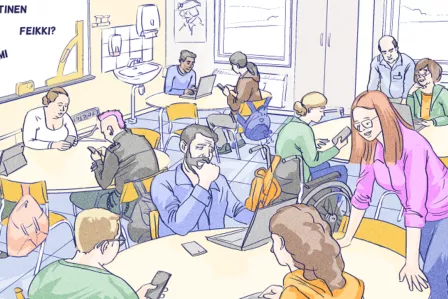The 2019 National Media Education Policy of Finland identifies social polarisation and racism as problems that need to be addressed in media education.

According to the policy, media education aims to promote human rights, equality and equity and create sustainable development conditions. Media education also promotes general human development, socio-economic, gender, age, and ethnic equality and addresses ethical and moral issues.
Diversity is one of the hallmarks of media education and a strength of the field and its activities. Media education that promotes equality respects cultural diversity and the uniqueness of people. Media education for equality is promoted through, for example, awareness of the target group and improving accessibility of activities and materials.
Media education is based on freedom of speech, opinion, expression, thought and action, and it also promotes the objectives of human rights and democracy. Freedom of expression also includes responsibility and accountability, such as respecting copyright and others and opposing hate speech restricting freedom of expression.
In addition, the National Audiovisual Institute of Finland has published the Instructional Principles for Inclusive Media Education, which aims to support media educators on a practical level in equal and non-discriminatory media education.
You can find practical information and exercises about media education and equality from these resources (in English):
- Fair Play - Confronting Racism and Coloniality in Games - A Media Education Handbook
- Messages in a Bottle - Empathy Skills through Media Education
Find out more about the work of the Finnish Safer Internet Centre, including its awareness raising, helpline, hotline and youth participation services – or find similar information for Safer Internet Centres throughout Europe.
The 2019 National Media Education Policy of Finland identifies social polarisation and racism as problems that need to be addressed in media education.

According to the policy, media education aims to promote human rights, equality and equity and create sustainable development conditions. Media education also promotes general human development, socio-economic, gender, age, and ethnic equality and addresses ethical and moral issues.
Diversity is one of the hallmarks of media education and a strength of the field and its activities. Media education that promotes equality respects cultural diversity and the uniqueness of people. Media education for equality is promoted through, for example, awareness of the target group and improving accessibility of activities and materials.
Media education is based on freedom of speech, opinion, expression, thought and action, and it also promotes the objectives of human rights and democracy. Freedom of expression also includes responsibility and accountability, such as respecting copyright and others and opposing hate speech restricting freedom of expression.
In addition, the National Audiovisual Institute of Finland has published the Instructional Principles for Inclusive Media Education, which aims to support media educators on a practical level in equal and non-discriminatory media education.
You can find practical information and exercises about media education and equality from these resources (in English):
- Fair Play - Confronting Racism and Coloniality in Games - A Media Education Handbook
- Messages in a Bottle - Empathy Skills through Media Education
Find out more about the work of the Finnish Safer Internet Centre, including its awareness raising, helpline, hotline and youth participation services – or find similar information for Safer Internet Centres throughout Europe.
- policy media literacy media education inclusion digital citizenship
Related content
- < Previous article
- Next article >












